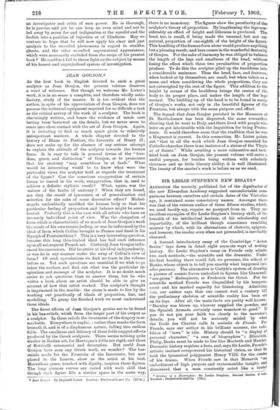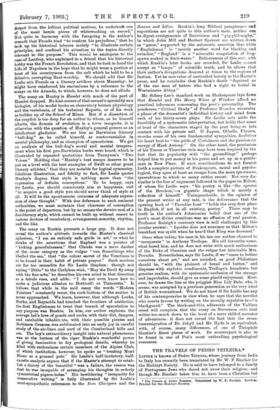SIR LESLIE STEPHEN'S NEW ESSAYS.*
ALTHOUGH the recently published list of the dignitaries of the new Edwardian Academy suggested uncomfortable com- parisons between ourselves and certain dates of the Victorian age, it contained some consolatory names. Amongst them was that of the veteran author of these fifteen studies, which, we need hardly say, require no passport from us. They are
excellent examples of Sir Leslie Stephen's literary skill, of the breadth of his intellectual horizon, of his scholarship and impartiality, of the brilliant though sometimes rambling manner by which, with its alternations of rhetoric, epigram, and humour, the reader, even when not persuaded, is inevitably charmed.
A learned introductory essay of the Cambridge "Acton, Series" lays down in detail eight separate ways of writing history. Sir Leslie Stephen's essay on Froude only admits two such methods,—the scientific and the dramatic. Under his first heading there would fall, we presume, the school of Ranke, whose object is to tell you exactly what happened (wie alles gewesen). The alternative is Carlyle's system of drawing a picture of cosmic forces embodied in figures like Cromwell,
" sea-green " Robespierre, or Frederick the Great. For the
scientific method Froude was disqualified by his tempera- ment and his marked capacity for blundering. Admitting this, our author says that one cannot wait a century till the preliminary skeleton of scientific reality has been set on its legs. After all, the main facts are pretty well known: "Darnley was blown up, whoever supplied the powder, and the Spanish Armada certainly came somehow to grief." If you do not pin your faith too closely to the narrator's details, you will not be seriously misled by what
the Ecole des Chartes calls /a maladie de Fronde. For Froude, says our author in his brilliant manner, the exhi- bition of " laws " is idle. History should be "a display of personal character," "a sum of biographies" Elizabeth, Philip, Drake must be made to live like Macbeth and Hamlet
Dramatic history requires a hero, and, says Sir Leslie, Fronde 's artistic instinct overpowered his historical vision, so that he
took the tyrannical polygamist Henry VIII. for the centre of his drama. When Froude saw in that Monarch "au embodiment of high purpose and statesmanlike insight, and discovered that a man constantly acted like a brutal • Studies of a Biographer. By Leslie Stephen. Second Series. St London : Duckworth and Co. DEL] despot from the loftiest political motives, he undertook one of the most heroic pieces of whitewashing on record." Not quite in harmony with the foregoing is the author's remark that Froude read "to confirm his prejudices," that he took up his historical labours mainly "to illustrate certain principles, and confined his attention to the topics directly relevant to the purpose." This would be analogous to the case of Lanfrey, who explained to a friend that his historical hobby was the French Revolution, and that he took in hand the Life of Napoleon in the hope that he might wean a portion at least of his countrymen from the cult which he held to be a delusive, corrupting Baal-worship. We should add that Sir Leslie sets Froude as a literary artificer above Macaulay: he might have reinforced his encomiums by a reference to the essays on the Armada, to which, however, he does not allude.
The essay on Huxley is Hamlet with much of the part of Hamlet dropped. No hint occurs of that savant's speciality as a biologist, of his model books on elementary human physiology and the vertebrate, of his technical Reports, or of his work as builder up of the School of Mines. But if a dissection of the crayfish is too deep for an author to whom, as he himself admits, the domain of evolution is a terra incognita, it is otherwise with the question of Huxley's general powers as an intellectual gladiator. We see him as Darwinian literary "bull-dog," as he called himself, as controversialist in mental philosophy, and as champion of agnosticism. We get an analysis of the bull-dog's moral and mental tempera- ment when his first pro-Darwinian barks were beard, which is illustrated by repeated quotations from Tennyson's "Two Voices." Holding that "Huxley's best essays deserve to be put on a level with the best examples of Swift or other great literary athletes," that they are notable for logical symmetry, felicitous illustration, and fidelity to fact, Sir Leslie quotes Huxley's dogma that style is nothing more than "the expression of definite conceptions." To be happy, says Sir Leslie, you should consciously aim at happiness, and "to acquire a good style you should never think of style at all. It will be the spontaneous outcome of adequate expres- sion of clear thought." With due deference to such eminent authorities, we must maintain that clearness of conception is the point of departure, but by no means the de-rnier snot, of a fine literary style, which cannot be built up without resort to various devices of vocabulary, arrangement, sonority, rhythm, and the like.
The essay on Ruskin presents a large gap. It does not reveal the author's attitude towards the Master's classical aphorism, "I am an entirely safe guide in art," or what he thinks of the assertions that Raphael was a painter of "kicking gracefulnesses," that Claude was a mere dauber of the same category as the vulgar "van Somethings who libelled the sea," that "the colour secret of the Venetians is to be found in their habit of private prayer." Such matters are far too recondite for Sir Leslie Stephen: though not saying "Ditto" to the Carlylese wish, "May the Devil fly away with the fine arts," he describes his own mind in that direction as a tabula rasa, and adds : "I do not even know how to make a judicious allusion to Botticelli or Tintoretto." It follows that while in the said essay the words "Modern Painters" constantly recur, the rock-bottom of the matter is never approached. We learn, however, that although Locke, Burke, and Reynolds had touched the frontiers of aesthetics, the first Englishman to treat that branch of speculation to any purpose was Ruskin. In him, our author explains, the average lad's love of ponds and rocks, with their dirt, dangers, and catchable inhabitants, with their possible pirates and Robinson Crimes, was sublimated into an early joy in careful study of the air-lines and surf of the Cumberland hills and sea. The boy's extraordinary' insight into natural phenomena was at the bottom of the riper Ruskin's wonderful power of giving fascination to dry geological details, whereby he filled with enthusiasm certain members of the Alpine Club, of which institution, however, he spoke as "treating Mont Blanc as a greased pole." Sir Leslie's half-laudatory, half- caustic analysis argues that if the Master's attempt to estab- lish a theory of the beautiful "was a failure, the reason was that he was incapable of arranging his thoughts in orderly Pymmetrioal pigeon-boles." His bewildering "incapacity for consecutive writing" is fully illustrated by Sir Leslie's semi-sympathetic references to the Fors Clavigera and the Sesame and Lilies. Ruskin's long Biblical paraphrases and expositions are not quite to this author's taste, neither can be digest arraignments of Darwinism and "pig-philosophy," in which John Mill and Herbert Spencer are written down as "geese," supported by the axiomatic assertion that while "Englishman" is "merely another word for blackleg and swindler," "England" is a "miserable coagulation of frog- spawn soaked in ditch-water." Deliverances of this sort, with which Ruskin's later books are crowded, Sir Leslie cannot accept as " lamps " of scientific truth, and he allows that their author's divagations descend at times to the regions of fustian. Yet he sees veins of unrivalled beauty in the Master's prose, and he concludes that Ruskin's death "deprived us of the one man of letters who had a right to burial in Westminster Abbey."
Mr. Sidney Lee's standard work on Shakespeare lays down that Hamlet and The Merry Wives of Windsor afford no practical inferences concerning the poet's personality. The ponderous "Critical Study" of Professor Brandes excavates a phase of the dramatist's individual history and mind from each of his thirty-seven plays. Sir Leslie sets aside the feasibility of a systematic interpretation, but holds that some at least of the characters staged by the poet bring us into contact with his private self. If Jaques, Othello, Ulysses, re-echo some of his own fundamental sympathies, doubtless his heart beat to "the pride of Cariolanus and the passionate energy of Mark Antony." On the other hand, the pessimism of his Timon or Thersites vein may have been inspired by the fact that its popularity with "the groundlings " perhaps helped him to put money in his purse and set up as a gentle- man in New Place. If such considerations do not furnish forth a complete picture of Shakespeare, moral and psycho- logical, they open at least an escape from the mere ignoramus, ignorabimus to which so many critics resort. Not very dis- similar is the line of argument followed in the paper on Milton, of whom Sir Leslie says : "his poetry is like the spectre of the Brocken,'—a gigantic shape which is merely a reflection of himself." Unimpeachable, in the opinion of the present writer at any rate, is the deliverance that the opening book of "Paradise Lost" "holds the very first place in English, if not in all existing, poetry." There may be truth in the author's Johnsonian belief that one of the poet's most divine creations was no effusion of real passion. Professor Raleigh's contrary view is well challenged by this jocular avowal: " Lycidas does not convince us that Milton's breakfast was spoilt when he heard that King was drowned."
Once when taking his ease in his inn our author chanced to " recuperate " in Anthony Trollope. His old favourite some- what bored him, and he does not write with much enthusiasm of the Duke of Omnium and the vulgar but inimitable Mrs. Proudie. Nevertheless, says Sir Leslie, if we "cease to bother ourselves about art," and are satisfied, as good Philistines should be, "with the plainest of bread and butter," and dispense with stylistic condiments, Trollope's humdrum but genuine realism, with its systematic exclusion of the strange and improbable, should give us some placid enjoyment. How- ever, he draws the line at the priggish Miss Lily Dale, who, it seems, was accepted by a previous generation as the very ideal of British womanhood. We do not know if Sir Leslie has any of his contemporaries in view when he says that the novelist who courts favour by writing on the morally repulsive is—" a blackguard." The thick-and-thin adherents of the Vailima creed will complain that the essay on Stevenson cuts that writer too much down to the level of a mere skilled narrator of adventures : it does not reveal the fact that the cross- transmigration of Dr. Jekyll and Mr. Hyde is an equivalent., with, of course, many differences, of one of Theophile Gautier's finest pieces of work. Its counterpart is also to be found in one of Poe's most enthralling psychological romances.











































 Previous page
Previous page